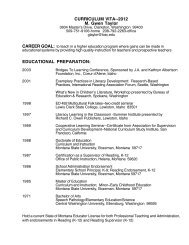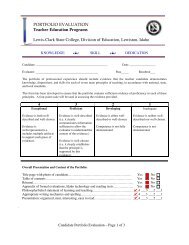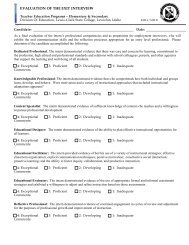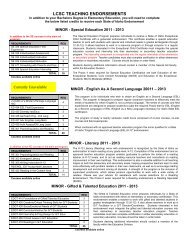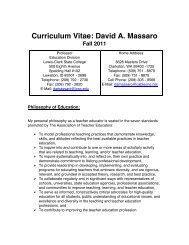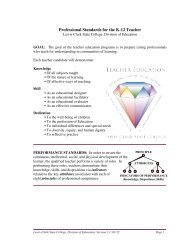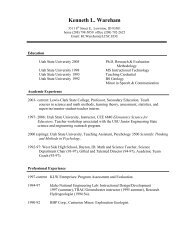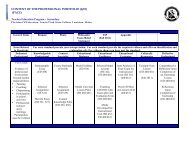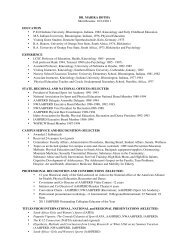PACE - LCSC Education Division - Lewis-Clark State College
PACE - LCSC Education Division - Lewis-Clark State College
PACE - LCSC Education Division - Lewis-Clark State College
Create successful ePaper yourself
Turn your PDF publications into a flip-book with our unique Google optimized e-Paper software.
Principle IV. A professional educator exemplifies honesty and integrity in the course ofprofessional practice. Unethical conduct includes but is not limited to:a. Fraudulently altering or preparing materials for licensure or employment;b. Falsifying or deliberately misrepresenting professional qualifications, degrees, academicawards, and related employment history when applying for employment and/or licensure;c. Failure to notify the state at the time of application for licensure of past revocations orsuspensions of a certificate/license from another state;d. Failure to notify the state of past criminal convictions at the time of application for licensure;e. Falsifying, deliberately misrepresenting, or deliberately omitting information regarding theevaluation of students and/or personnel, including improper administration of any standardizedtests (changing test answers; copying or teaching identified test items; unauthorized reading ofthe test to students, etc.);f. Falsifying, deliberately misrepresenting, or deliberately omitting reasons for absences orleaves;g. Falsifying, deliberately misrepresenting, or deliberately omitting information submitted in thecourse of an official inquiry and/or investigation; and,h. Falsifying, deliberately misrepresenting, or deliberately omitting material information on anofficial evaluation of colleagues.Principle V. A professional educator entrusted with public funds and property honors that trustwith a high level of honesty, accuracy, and responsibility. Unethical conduct includes but is notlimited to:a. Misusing, or unauthorized use of, public or school related funds or property;b. Failing to account for funds collected from students or parents;c. Submitting fraudulent requests for reimbursement of expenses or for pay;d. Comingling of public or school related funds in personal bank account(s);e. Using school computers for use in a private business;f. Using school computers to deliberately view or print pornography; and,g. Deliberate use of poor budgeting/accounting practices.Principle VI. A professional educator maintains integrity with students, colleagues, parents,patrons, or business personnel when accepting gifts, gratuities, favors, and additionalcompensation. Unethical conduct includes but is not limited to:a. Unauthorized soliciting of students and/or parents of students to purchase equipment orsupplies from the educator who will directly benefit;b. Accepting gifts from vendors or potential vendors for personal use or gain where there may bethe appearance of a conflict of interest;c. Tutoring students assigned to the educator for remuneration unless approved by the localboard of education; and,d. Soliciting, accepting or receiving a pecuniary benefit greater than fifty ($50.00) dollars asdefined in Idaho Code §181359(b).75



